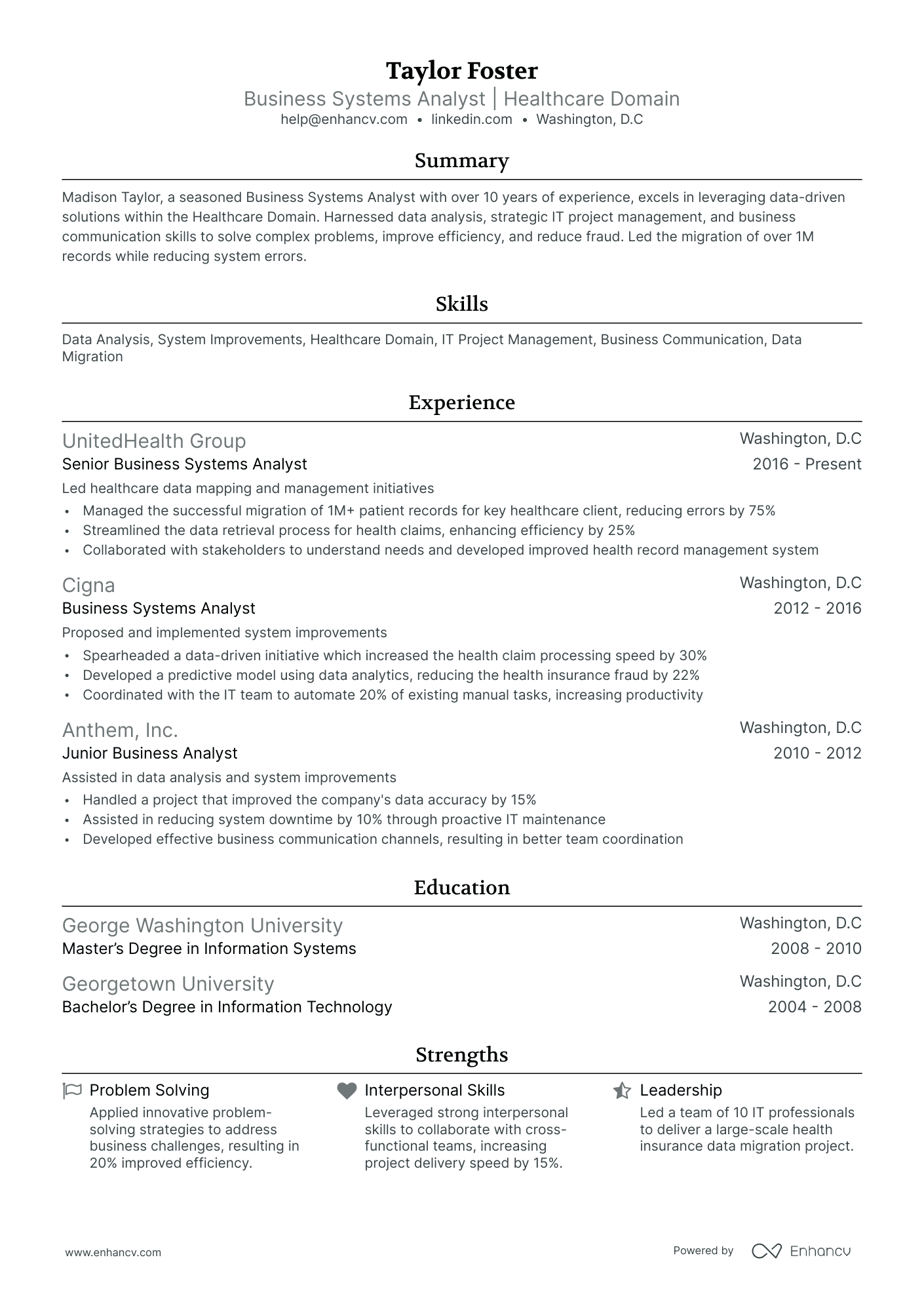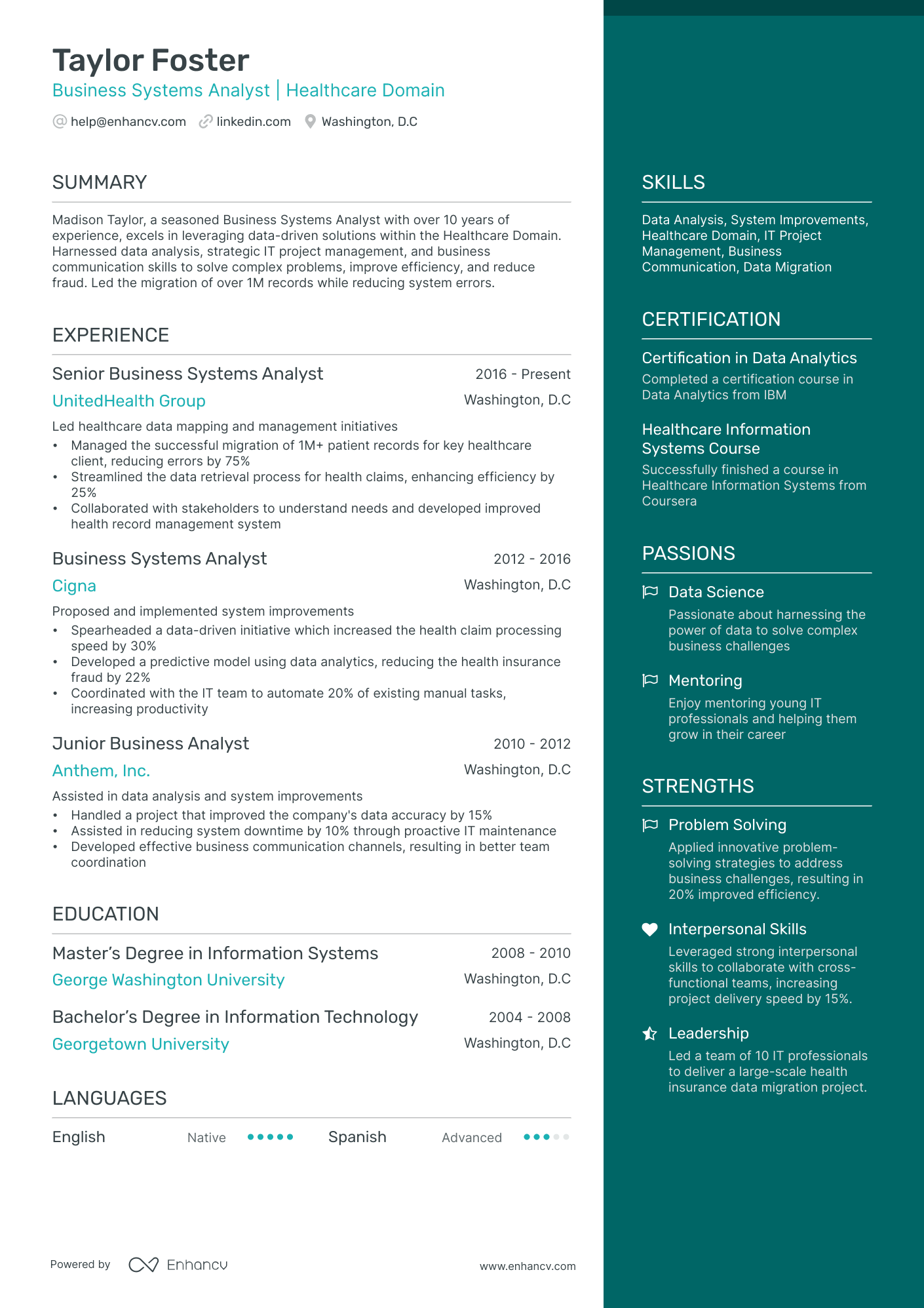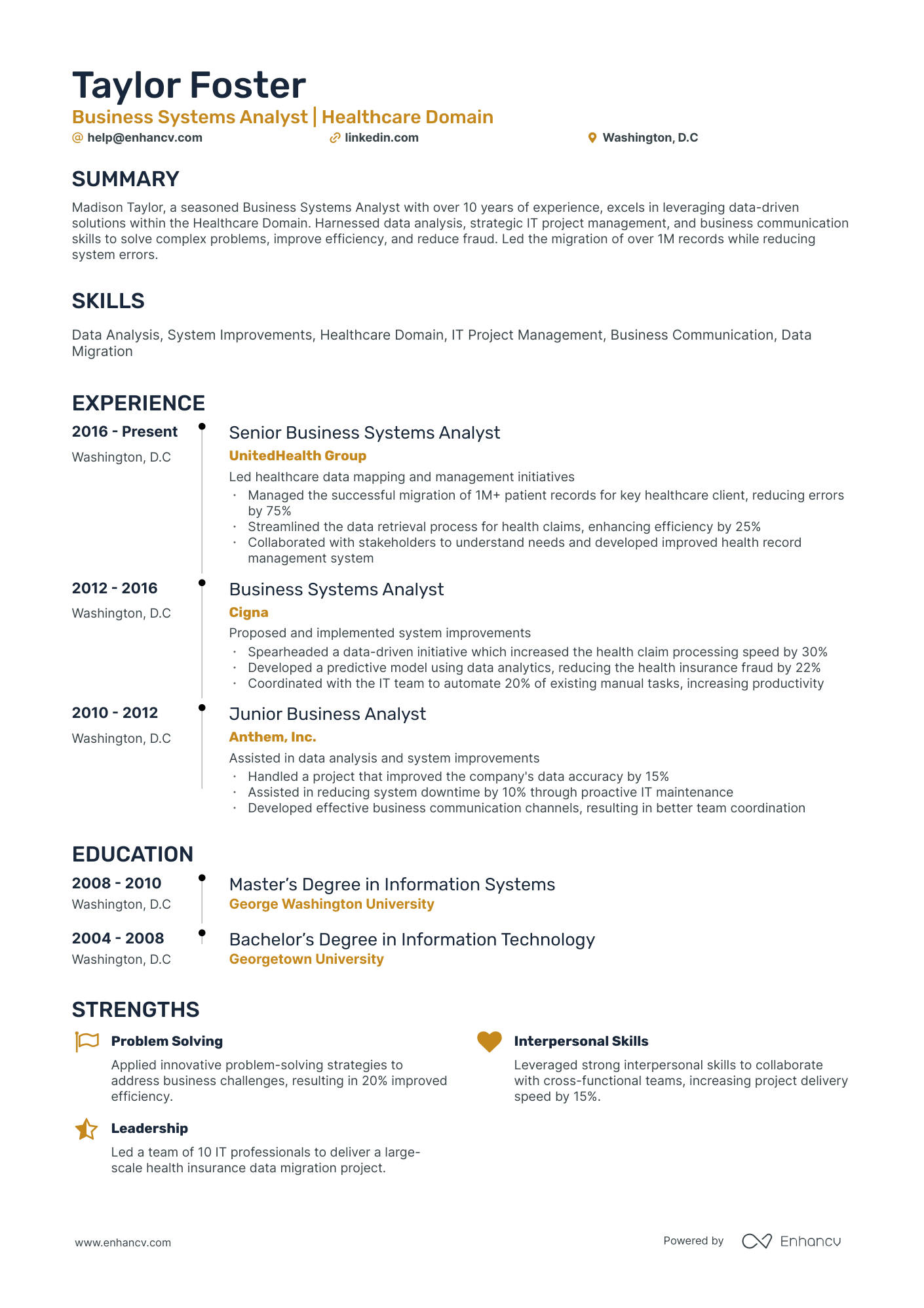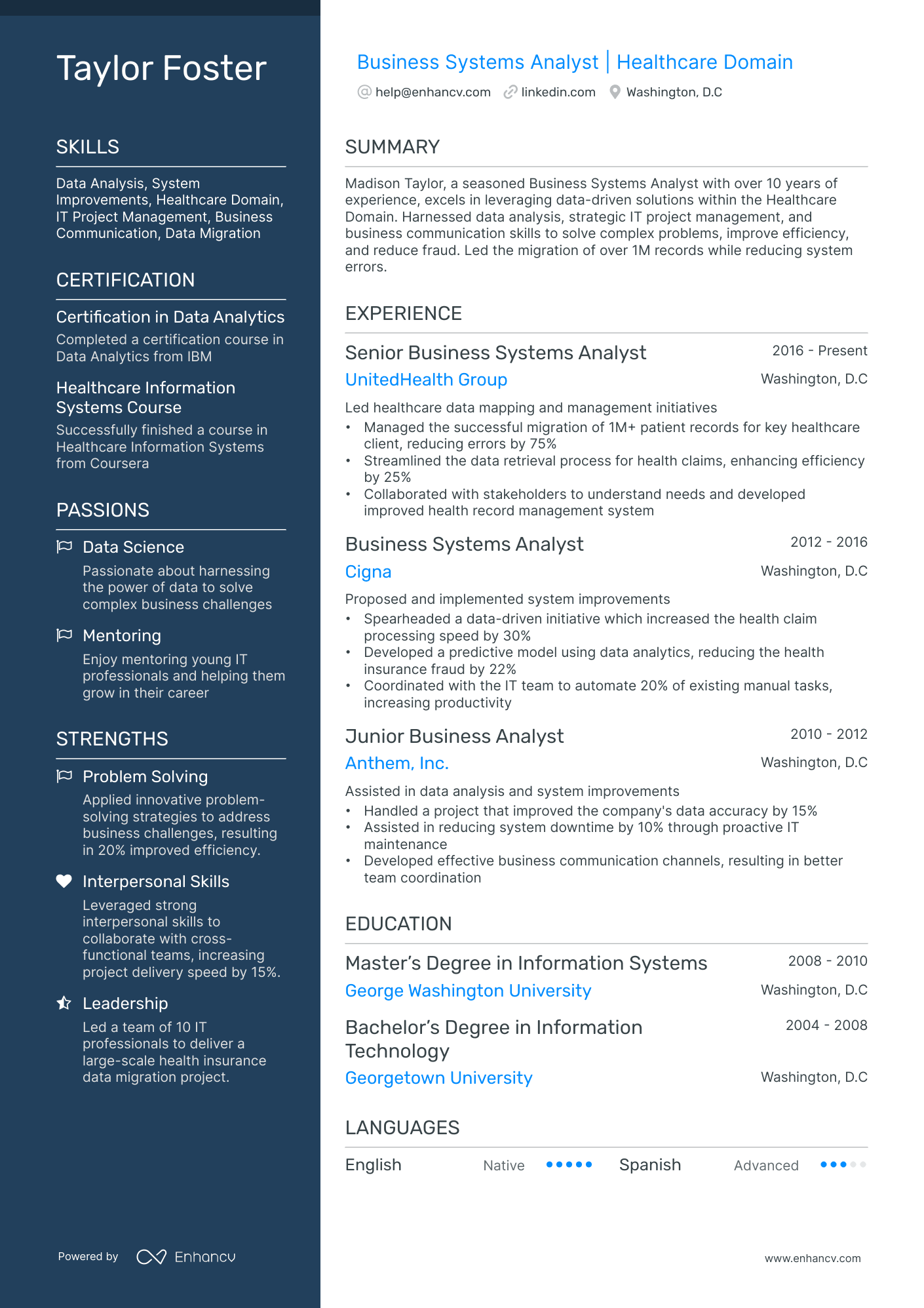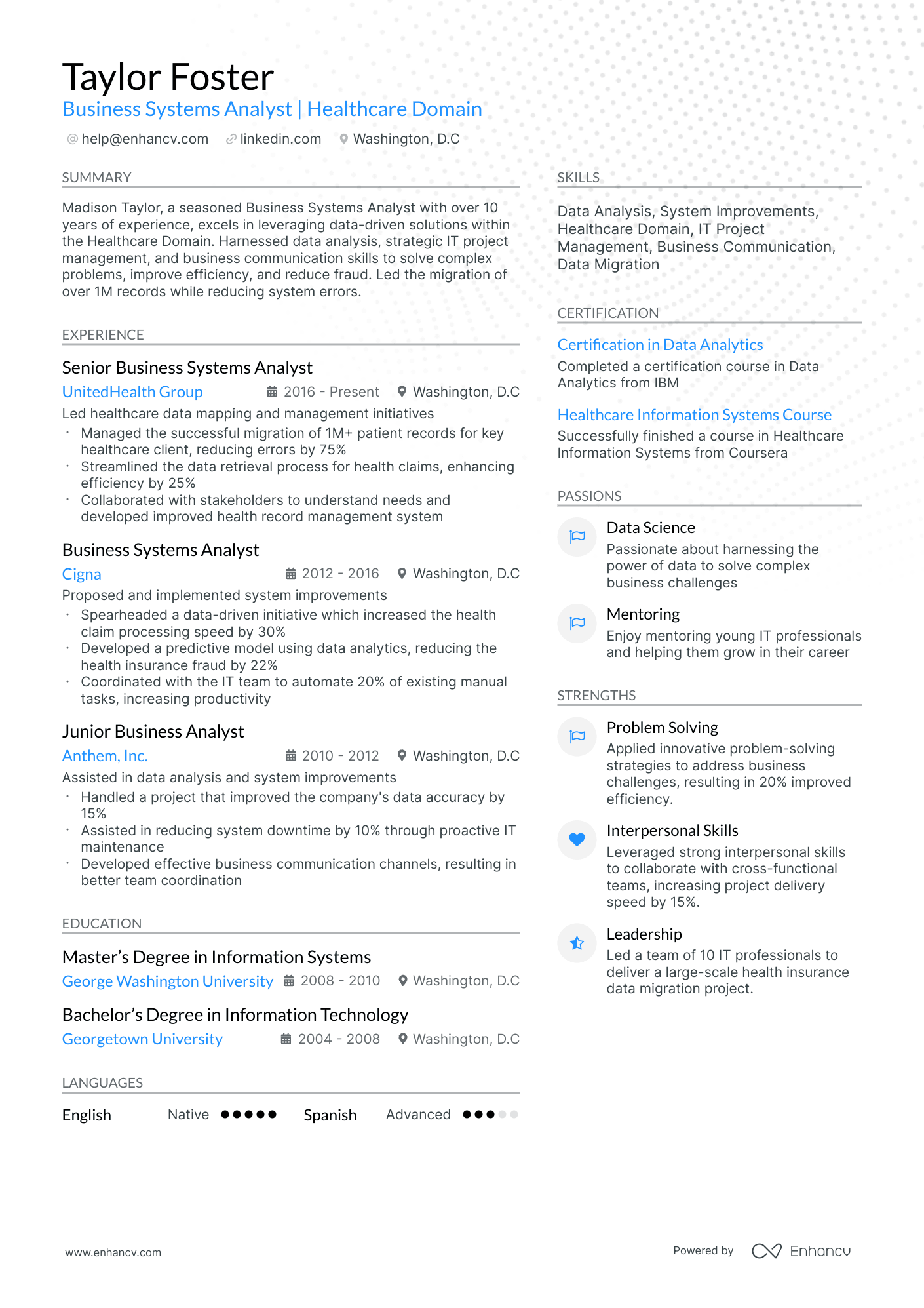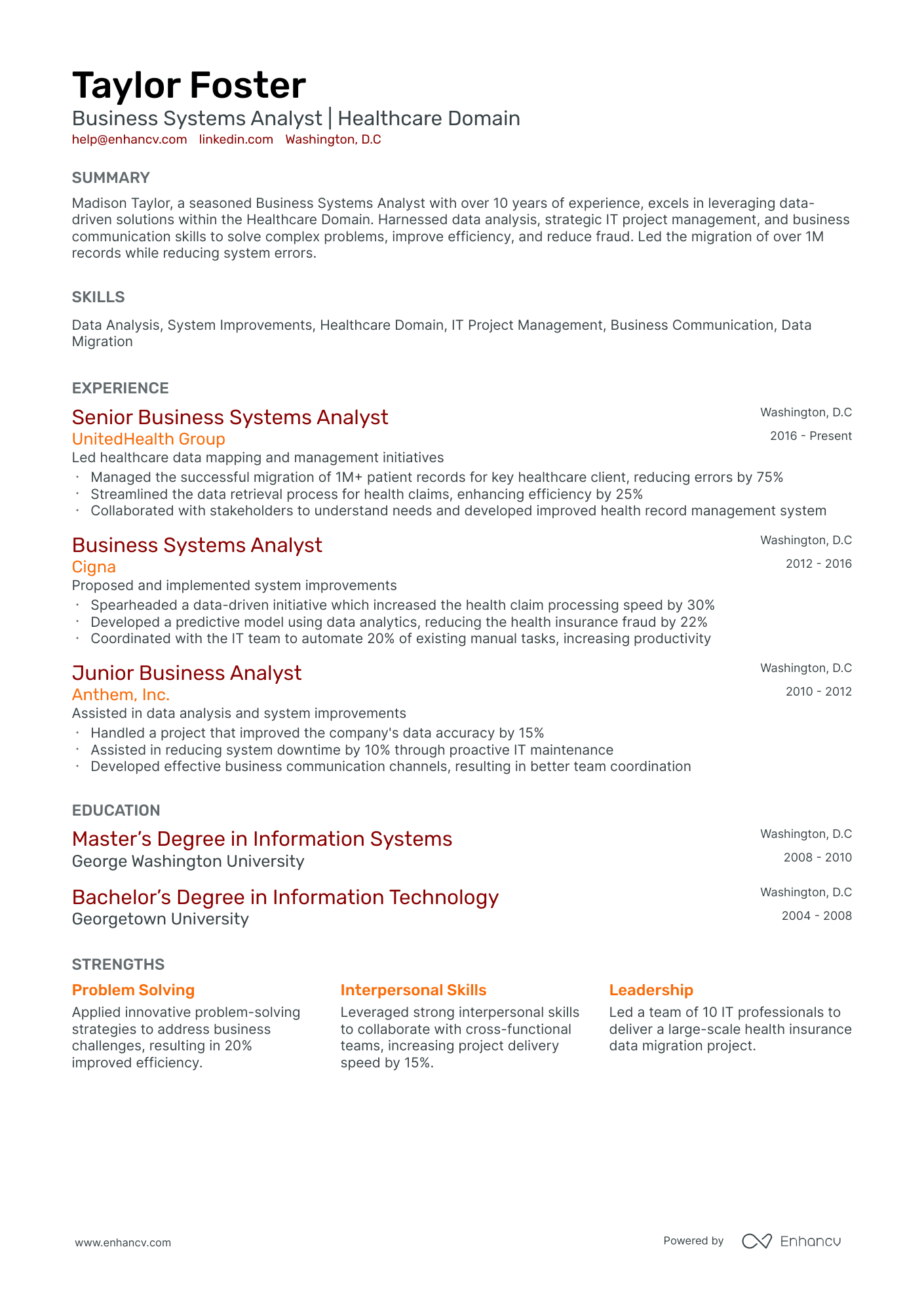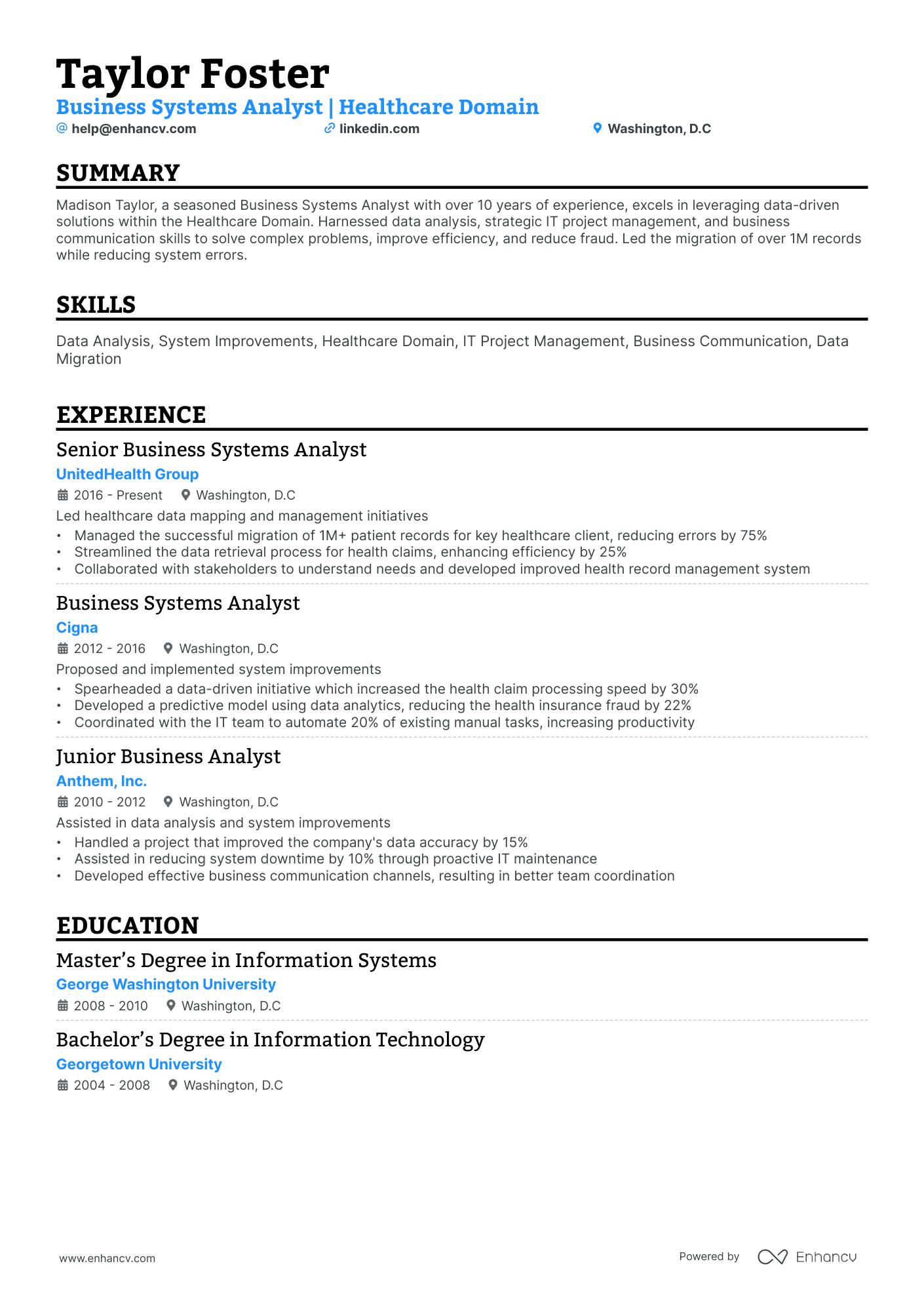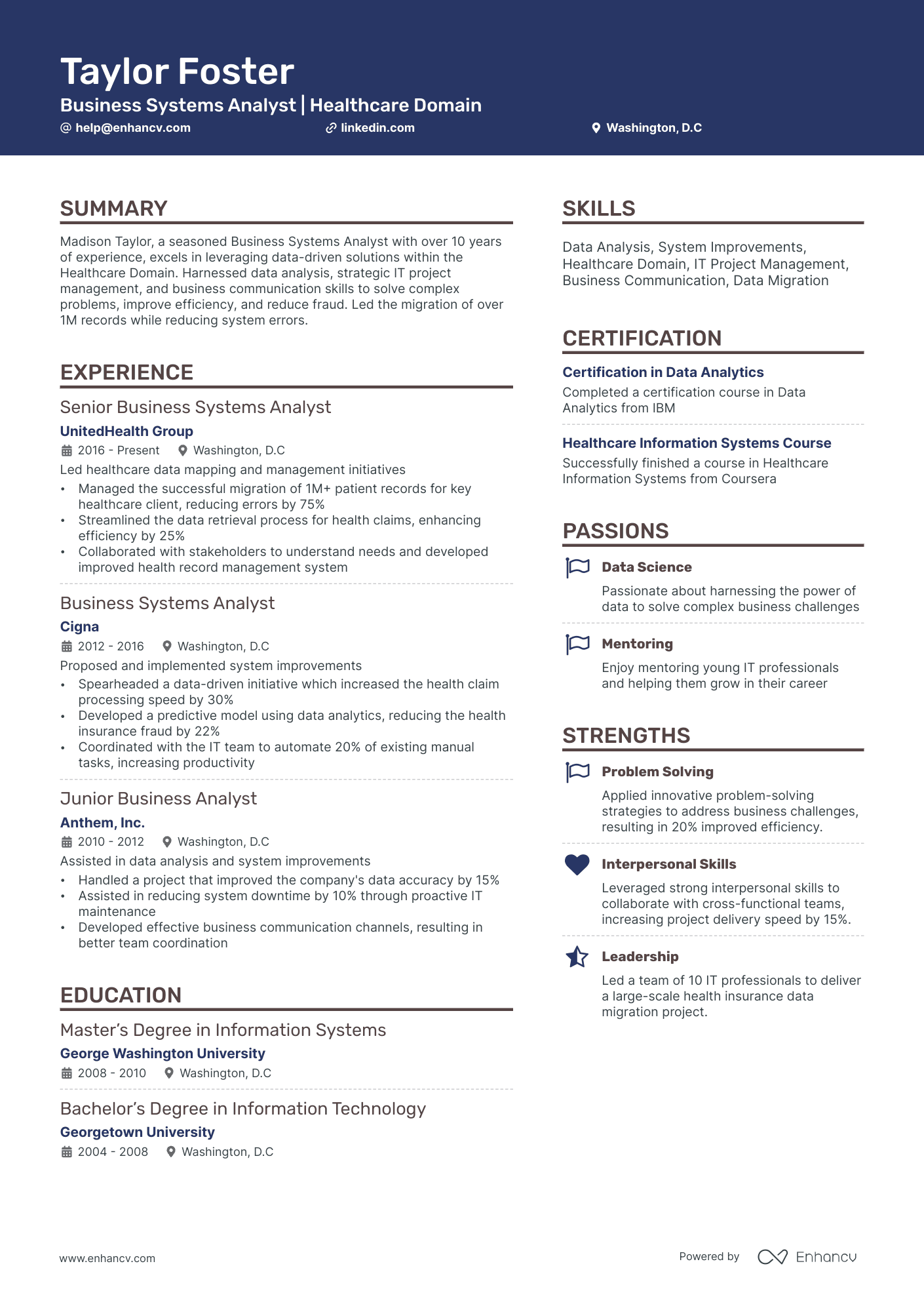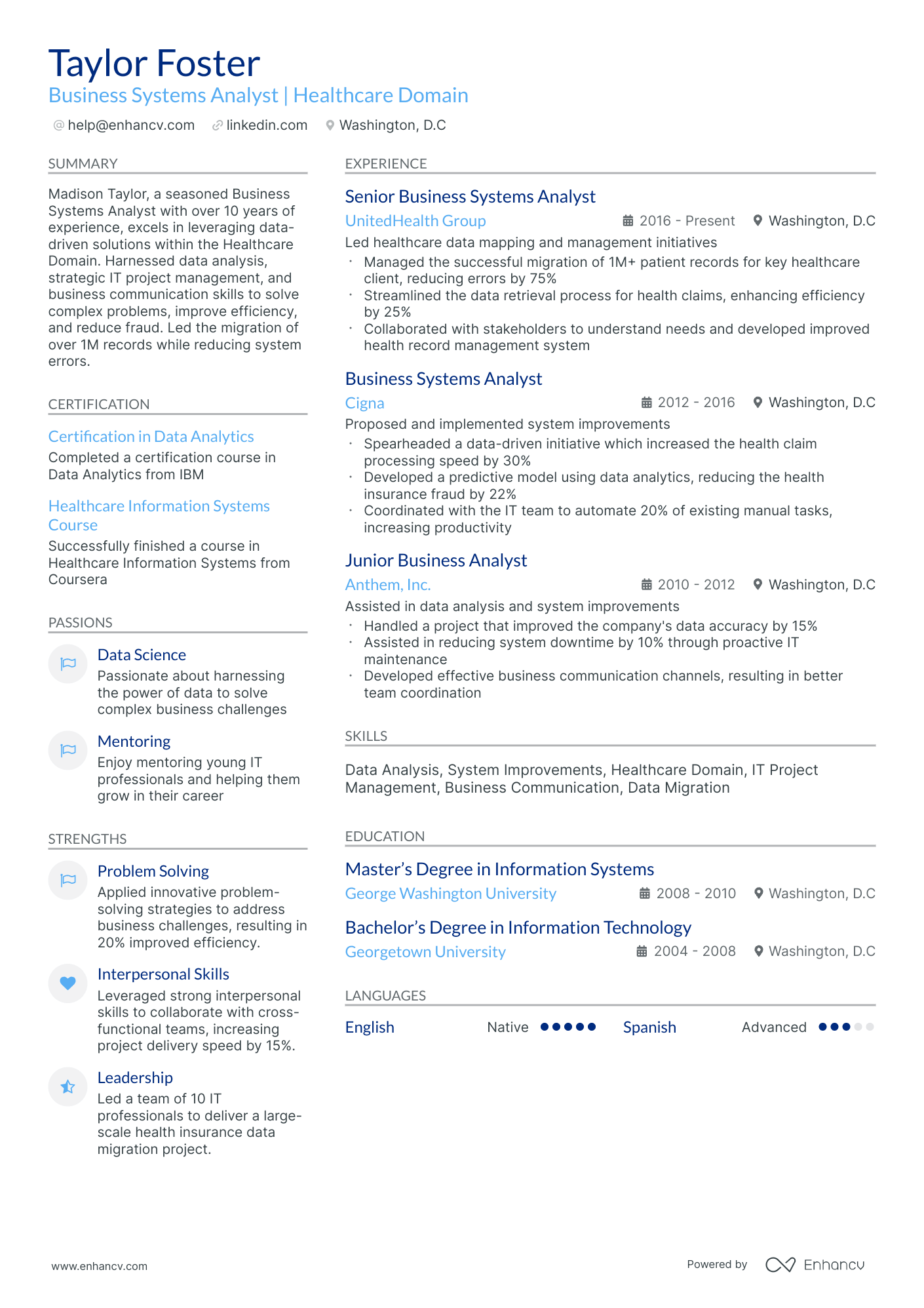One specific challenge faced by a business system analyst when writing a resume is adequately demonstrating their ability to translate complex business problems into manageable, technological solutions. Our guide can assist in addressing this challenge by providing detailed examples and proven strategies for effectively communicating these unique analytical skills and experiences on your resume.
Stay tuned for more ideas on how to write your business system analyst resume:
- Find different business system analyst resume examples to serve as inspiration to your professional presentation.
- How to use the summary or objective to highlight your career achievements.
- How to create the experience section to tell your story.
- Must have certificates and what to include in the education section of your resume.
Recommended reads:
Styling your business system analyst resume: layout and format
Pondering the ideal length for your business system analyst resume? Experts suggest keeping it between one and two pages. Opt for the two-page format if you boast over a decade of pertinent experience. Moreover, the resume format you choose is pivotal in showcasing your experience. Consider the:
- Reverse-chronological resume format to spotlight your career journey;
- Functional skill-based resume format if you're light on experience but want to emphasize skills;
- Hybrid resume format to provide recruiters a comprehensive view of both your experience and skills.
Here are some additional tips for your business system analyst resume layout:
- Keep your headline straightforward: mention the job you're targeting, a notable certification abbreviation, or your professional specialty;
- Always customize your business system analyst resume for the specific role, aligning job requirements with your experience in various resume sections;
- After finalizing your resume, save it as a PDF (unless instructed otherwise) to maintain its readability and layout consistency.
Consider the local standards – Canadian resumes, for example, may have a different format.
Upload your resume
Drop your resume here or choose a file. PDF & DOCX only. Max 2MB file size.
Pro tip
Your resume will likely be processed by an Applicant Tracking System (ATS). Ensure your header, summary, or objective incorporates essential skills required for the role.
Essential components for your business system analyst resume:
- Header: Feature your name prominently. If you have a notable degree or certification, append it next to your name. Include contact details, a link to your portfolio, and a concise headline.
- Summary or Objective: Align your professional trajectory and standout achievements with the desired role.
- Experience: Craft concise bullet points, highlighting tangible successes and contributions.
- Skills: Showcase them throughout your resume and consider a dedicated sidebar for emphasis.
- Education & Certifications: Reinforce your credibility and demonstrate your commitment to the industry.
What recruiters want to see on your resume:
- Technical Understanding: Demonstrated knowledge of various business systems, databases, programming languages, and software development methodologies.
- Business Acumen: Understanding of the specific industry and its key operations, including familiarity with standard business processes and financial principles.
- Analytical Skills: Ability to solve complex problems, analyze data, and make decisions that affect the company's bottom line.
- Communication Skills: Proficiency in conveying complex technical information to non-technical stakeholders, as well as strong written communication skills for creating comprehensive system documentation.
- Project Management Experience: Evidence of effectively managing multiple tasks or projects at once, meeting deadlines, and coordinating across teams and departments.
Recommended reads:
Writing your business system analyst resume experience
Here are some quick tips on how to curate your business system analyst professional experience:
- Always ensure that you quantify your achievements by implementing the Situation-Task-Action-Result framework;
- When writing each experience bullet, make sure you're using active voice;
- Stand out by including personal skills you've grown while at the job;
- Be specific about your professional experience - it's not enough to say you have great communication skills, but rather explain what your communication track record led to?
Wondering how other professionals in the industry are presenting their job-winning experience? Check out how these business system analyst professionals put some of these best practices into action:
- Conducted in-depth business process analysis resulting in the identification of inefficiencies and cost-saving opportunities.
- Collaborated with cross-functional teams to develop and implement system enhancements, improving overall operational efficiency by 20%.
- Led the successful implementation of a new CRM system, resulting in a 30% increase in customer satisfaction ratings.
- Performed comprehensive requirements gathering for multiple projects, ensuring alignment with business objectives and user needs.
- Developed detailed functional specifications and use cases, facilitating effective communication between stakeholders and development teams.
- Managed end-to-end testing efforts, resulting in a 25% reduction in defects and ensuring successful system deployments within project timelines.
- Evaluated existing systems and processes, identifying opportunities for automation and streamlining resulting in a 15% increase in overall productivity.
- Led a project to integrate a new financial management system, enabling real-time financial reporting and reducing month-end closing time by 50%.
- Collaborated with business users and IT teams to define business requirements and translate them into technical specifications for system enhancements.
- Led the implementation of a data analytics platform, enabling data-driven decision-making and resulting in a 40% improvement in forecasting accuracy.
- Facilitated workshops and interviews to elicit business requirements and conducted gap analysis to identify areas for process improvement.
- Collaborated with development teams to design and implement scalable and user-friendly solutions, reducing system downtime by 20%.
- Managed the end-to-end implementation of an enterprise-wide ERP system, resulting in improved data visibility and streamlined operations across departments.
- Developed and implemented comprehensive test plans, ensuring high-quality software delivery and minimizing post-production defects by 30%.
- Provided training and support to end-users, enabling successful adoption of new systems and processes.
- Conducted detailed business impact analysis for technology initiatives, assessing risks and designing mitigation strategies.
- Collaborated with stakeholders to define project scope, objectives, and success criteria, resulting in on-time and within-budget project deliveries.
- Implemented Agile methodologies, increasing team collaboration and reducing project cycle time by 15%.
- Identify and document business requirements, user stories, and acceptance criteria for system enhancements and new feature developments.
- Collaborate with development teams to analyze technical feasibility and provide input on design and architecture decisions.
- Conduct thorough system testing and support user acceptance testing, ensuring high-quality deliverables.
- Managed the implementation of a cloud-based CRM system, resulting in a 20% increase in sales productivity and improved customer relationship management.
- Led requirements gathering workshops and facilitated discussions to capture functional and non-functional requirements.
- Developed and executed data migration strategies to ensure seamless transition from legacy systems to the new CRM platform.
- Analyzed business processes and recommended process improvements, leading to a 25% reduction in operational costs.
- Collaborated with stakeholders to define project scope and objectives, and managed project timelines and deliverables.
- Developed and delivered training programs to end-users, ensuring effective utilization of implemented systems.
- Acted as a liaison between business users and development teams, ensuring successful requirements elicitation and solution delivery.
- Led the implementation of a business intelligence solution, resulting in improved data visualization and decision-making capabilities.
- Conducted user acceptance testing and facilitated training sessions to promote user adoption and proficiency in new systems.
Quantifying impact on your resume
<ul>
Lacking experience? Here's what to do.
Candidates with limited experience often fall into two categories:
- Recent graduates aiming for a business system analyst role
- Professionals transitioning from a different field
Both can still land a job in the industry. Here's how to optimize the experience section of your business system analyst resume:
- Highlight your strengths, especially if they align with the job requirements.
- Remove unrelated experiences. Your resume should tell a story that resonates with the business system analyst role.
- Showcase your personality. Traits like ambition and diligence can make you an attractive candidate.
- Align your experience with the job requirements, ensuring your resume speaks directly to the role.
Recommended reads:
Pro tip
Use the SOAR (Situation - Action - Results) method for each of your business system analyst experience bullets. Reflect on specific challenges you've addressed, the actions you took, and the outcomes. This approach also preps you for potential interview questions.
Essential business system analyst resume skills
When recruiters review business system analyst resumes, they're looking for a mix of technical know-how and personal attributes.
Technical skills demonstrate your proficiency in specific tools or tasks. They indicate if you're ready to jump into the role or if you'll need extensive training.
On the other hand, soft skills reflect your interpersonal abilities. They show how you'll fit into a team or company culture.
To effectively present these skills on your resume:
- Design a skills section that highlights both your technical and interpersonal strengths.
- Provide examples where you've applied these skills, such as projects or tasks.
- For soft skills, describe situations where they've been crucial to your success.
- Use metrics, like improved efficiency or positive feedback, to validate your skills.
For inspiration, explore the preferred skills of leading business system analyst professionals.
Top skills for your business system analyst resume:
SQL
Business Process Modeling
Data Analysis
Requirements Gathering
UML
Agile Methodologies
JIRA
Microsoft Excel
Tableau
SAP
Communication
Problem Solving
Critical Thinking
Team Collaboration
Adaptability
Time Management
Detail Oriented
Negotiation
Customer Focus
Analytical Mindset
Pro tip
Double-check the spelling of all skills and tools on your resume. Remember, software like the Applicant Tracker System (ATS) scans for these details.
Choosing the right certifications and education for your business system analyst resume
Your education section can highlight skills and experiences perfect for the job.
- List college or university degrees with the school name and dates.
- If you're still studying, mention your expected graduation date.
- Think twice before adding unrelated degrees. Space on your resume is precious.
- Discuss educational achievements if they boost your job relevance.
There are many certifications out there. Which ones should you include?
- List your main degree in a separate section with the school name and dates.
- Only add certifications that highlight your skills and experience.
- Place unique or recent certifications near the top.
- Add a brief description to certifications if it helps show your skills.
Remember, it's not about quantity but relevance.
Best certifications to list on your resume
- Certified Business Analysis Professional (CBAP) - International Institute of Business Analysis
- Certified Information Systems Security Professional (CISSP) - (ISC)²
- Certified Information Systems Auditor (CISA) - ISACA
- Entry Certificate in Business Analysis (ECBA) - International Institute of Business Analysis
- Tableau Desktop Certified Associate - Tableau
Pro tip
If you're in the process of obtaining your certificate or degree, list the expected date you're supposed to graduate or be certified.
Recommended reads:
Choosing between a resume summary or objective
Many business system analyst candidates ponder whether to include a resume summary or objective.
Here's a breakdown:
- A Resume objective outlines your career aspirations. It tells recruiters why you're applying and the value you can bring.
- A Resume summary offers a snapshot of your significant achievements, giving a quick overview of your expertise.
New professionals might lean towards an objective, while seasoned experts might prefer a summary. Whichever you choose, ensure it's tailored to the role.
For inspiration, review examples from established business system analyst professionals.
Resume summary and objective examples for a business system analyst resume
- Highly experienced Business Systems Analyst, boasting a 10-year track record in the financial sector. Expert in utilizing SAP and SQL for streamlined operation optimization. Proven success in leading cross-functional teams to improve operational efficiency, having saved millions of dollars through innovative process improvements.
- Seasoned professional transitioning into Business Systems Analysis from a successful career in project management. With over 8 years of experience, I bring great understanding of business operations and proficiency in tools like Tableau and Oracle. Recently led a team that boosted productivity by 20% through data-driven strategies.
- Ambitious problem-solver with a passion for technology and 7 years of experience as a Data Analyst looking to transition into Business Systems Analysis. Skilled at Python, R, and SQL, with a proven record of interpreting complex datasets to inform strategic decisions, leading to a 15% increase in business efficiency.
- Offering over a decade worth of experience as a Software Engineer, eager to apply my strong understanding of system development lifecycle and proficiency in Java & .NET in the field of Business Systems Analysis. Previously designed a major software component that improved system performance by 25%.
- Recently graduated computer science major seeking entry into the world of Business Systems Analysis. Eager to leverage my technical skills, including proficiency in SQL, Python, and data visualization, to help companies make data-driven decisions that align with their strategic goals.
- An enthusiastic graduate ready to commence a promising journey in the realm of Business Systems Analysis. Adept in programming languages like Java and C++, I aspire to use these skills and my analytical mindset to contribute to effective system improvements and drive business growth.
Optimize your resume summary and objective for ATS
Drop your resume here or choose a file.
PDF & DOCX only. Max 2MB file size.
How to include other relevant sections for your business system analyst resume
Apart from the standard sections listed in this guide, you have the opportunity to get creative when building your profile.
Select additional resume sections that you deem align with the role, the department, or the company culture.
Here are the ones we recommend:
- Language skills - use a profficiency framework to indicate your aptitude level;
- Hobbies and interests - you can share more about your favorite books or how you spend your time. It's great for culture alignment;
- Volunteering - helps you highlight the causes you care about and hints at people skills you gained such as teamwork, emotional intelligence, and organizational skills;
- Awards - the space for your most prominent business system analyst professional accolades and achievements.
Make sure that these sections don't take too much away from your experience, but instead build up your business system analyst professional profile. You can add them as a second column to your resume, or on a second page.
Key takeaways
- Keep your business system analyst resume clear and organized with key sections.
- Only include relevant details. Space is limited.
- Support your achievements with both hard and soft skills.
- Detail your experience, focusing on your industry expertise.
- Highlight the most relevant certifications to show your dedication to the field.
